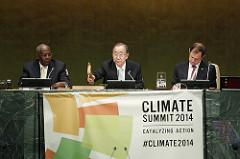Here in the UK
BEIS
BEIS, the Department for Business, Energy & Industrial Strategy, is the main government department responsible for tackling climate change. Its role includes:
- carbon budgets
- international climate change, including International Climate Fund
- climate science and innovation
- green finance
- energy efficiency and heat, including fuel poverty
Committee on Climate Change
The Committee on Climate Change (CCC) gives independent advice to government on building a low-carbon economy, including emissions targets, and preparing for climate change. The committee reports to Parliament on progress made on these.
It’s an independent, statutory body established under the Climate Change Act 2008.
UK legislation
The main piece of legislation governing the UK’s response to climate change is the Climate Change Act 2008.
It sets out targets for reducing the UK’s greenhouse gas emissions by at least 80% of 1990 levels by 2050.
It also includes measures to prepare the UK for the risks associated with climate change.
Stemming from the Climate Change Act, there are of course lots of other laws, regulations and policies, reflecting the various sources of our greenhouse gas emissions – from the Government’s environment policy to rules on agriculture and transport, for example.
Leading the change
Here are a few UK organisations playing a key role in efforts to tackle climate change.
Centre for Alternative Technology
CAT, based in Wales, is an education and visitor centre bringing to life practical solutions for sustainability. They run a year-long programme of courses, from building tiny houses to sustainable development. CAT is perhaps best known in climate change circles for its flagship research, the Zero Carbon Britain report, showing that a modern, zero-emissions society is possible using technology available today. One of the authors, Paul Allen, hails from Penrith. Find out more >
Transition Network
There are local Transition groups all over the world, including here in Cumbria, running hands-on projects to help their communities become more sustainable. It began in Totnes, Devon, in 2005 and there are Transition Town groups in more than 50 countries. It’s about local projects and partnerships to address the big global challenges we face. Find out more >>
Climate Outreach
Climate Outreach (formerly COIN) supports those of us who communicate about climate change. It produces world-leading advice and practical tools for engagement, used by governments, businesses, NGOs and grassroots organisations – including by us here at CAfS. From webinars to guides and reports, there’s a wide range of superb resources and research available on the Climate Outreach website. Find out more >
Internationally
UNFCCC
The United Nations Framework Convention on Climate Change (UNFCCC) is the international environmental treaty adopted on 9 May 1992 and opened for signature at the Earth Summit in Rio de Janeiro from 3 to 14 June 1992. It’s been the basis for governmental action on climate change ever since.
COP
COP is essentially the regular climate change conference organised by the United Nations, bringing countries together to decide and agree on measures to prevent damaging climate change.
Its full title is the Conference of the Parties to the United Nations Framework Convention on Climate Change (UNFCCC).
The latest conference was COP24, which took place from 3-14 December 2018, in Katowice, Poland.
IPCC
The Intergovernmental Panel on Climate Change (IPCC) assesses the science relating to climate change. It was set up in 1988 by the World Meteorological Organization (WMO) and United Nations Environment Programme (UNEP) to give policymakers regular assessments of the scientific basis of climate change, its impacts and future risks, and options for adaptation and mitigation.
IPCC assessments provide a scientific basis for governments at all levels to develop climate-related policies, and they underlie negotiations at the UN’s COP climate conferences.

